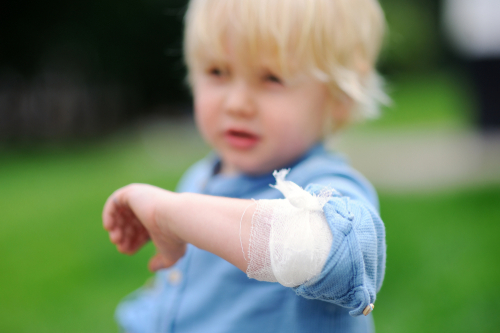ProQR to Receive Up to $5 Million from Nonprofits to Develop QR-313 for DEB
Written by |

ProQR Therapeutics is partnering with the nonprofit organizations EB Research Partnership (EBRP) and EB Medical Research Foundation (EBMRF) to develop QR-313, a treatment candidate for dystrophic epidermolysis bullosa.
Dystrophic epidermolysis bullosa (DEB), one of the major forms of EB, is caused by alterations in the COL7A1 gene in exon 73. Exons are the bits of DNA that contain the information to generate proteins. Mutations in COL7A1 lead to defects in type VII collagen (C7) protein, which is essential for the proper bonding of two skin layers, the epidermis and the dermis.
QR-313 is a new RNA-based molecule designed to produce normal C7 protein and restore a normal link between the two skin layers, thereby promoting wound healing and preventing blisters. The investigational therapy specifically uses a process called exon skipping, the exclusion of exon 73 from the messenger RNA that is used as a template for the production of C7 protein.
According to the agreement, EBRP and EBMRF will provide up to $5 million in matching funding to ProQR to develop QR-313.
“The EB Research Partnership and EB Medical Research Foundation are exceptional organizations and we look forward to collaborate on our mission to develop a life changing treatment for patients with this devastating disease,” Daniel A. de Boer, CEO at ProQR, said in a press release.
“With the funding from these partners, we plan to accelerate the development of QR-313 for the treatment of DEB. And if we are successful with QR-313, we believe there is potential to expand this approach of exon skipping into other mutations that cause DEB and help even more patients,” de Boer added.
ProQR expects to begin patient enrollment soon in the WINGS Phase 1/2 clinical trial, a first-in-human assessment of the safety and tolerability of topically applied QR-313 in DEB. Preliminary results are expected later this year, and full results are expected in 2019.
WINGS will be a double-blind, placebo-controlled study to test QR-313 in approximately eight patients older than 2 with recessive DEB, a more severe form of the disease. The study will also evaluate effects on wound healing, skin strength, and the presence of C7 protein in the skin, among other parameters. WINGS will be conducted across the U.S. and Europe.
“DEB has a huge impact on patients’ quality of life and there are currently no approved disease-modifying treatment options beyond wound care,” said Alex Silver, founder and chairman at EBRP, and Paul Joseph, CFO of EBMRF. “Our organizations are excited to partner with the ProQR team, in the hopes that the development of QR-313 will provide a much-needed treatment option to this community.”
In 2017, both the U.S. Food and Drug Administration and the European Medicines Agency granted orphan drug designation to QR-313.





